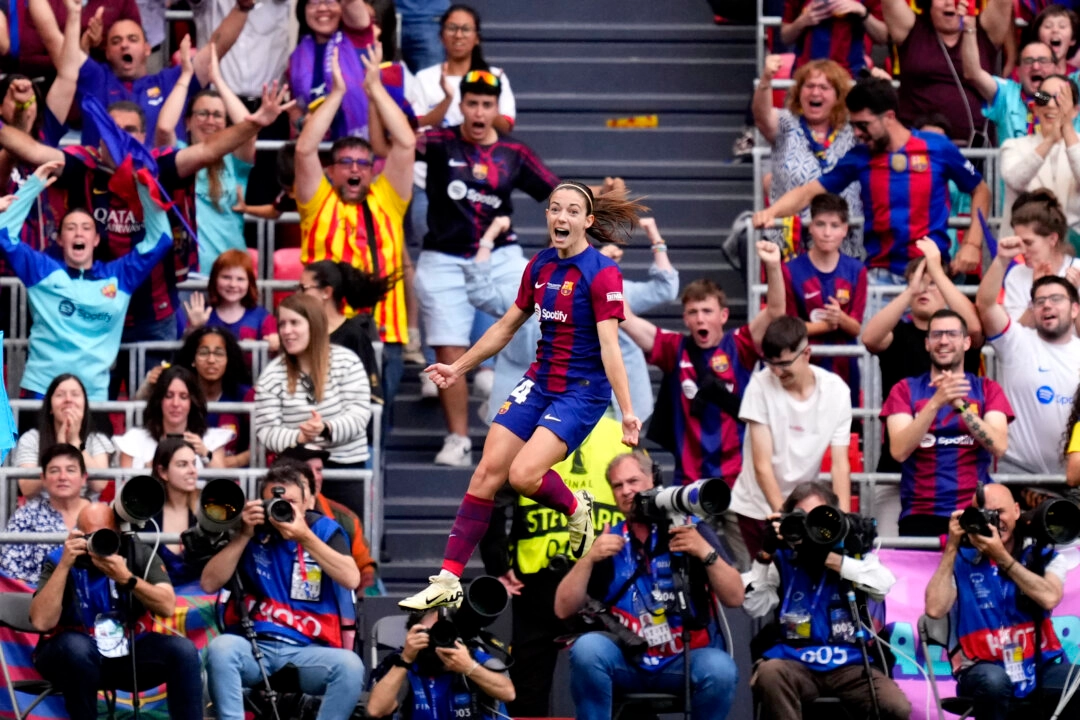BILBAO, Spain—It was a night of celebration for Barcelona after another Women’s Champions League title, and for the women’s game in general after another season with significant growth in the sport.
Barcelona defeated Lyon 2–0 to win its third European trophy and to add to its recent dominance in the sport on Saturday, capping a year that saw increased attendance, additional revenue and more participation by women across all levels of the sport.
A record crowd of 50,827 for a final was on hand to see Barcelona lift the trophy after beating record eight-time champion Lyon with goals by stalwart players Aitana Bonmatí and Alexia Putellas at the packed San Mames Stadium in Bilbao.
The Barcelona victory came as soccer officials celebrated the success of a five-year plan to boost the women’s game, a plan that was renewed ahead of the final to keep the sport growing.

The “Time for Action” project was put in place by UEFA in 2019 to try to improve women’s soccer. The European soccer body aimed to double the number of women and girls playing the game, and said it more than doubled that target with nearly three million women and girls currently playing soccer thanks to “investment in key initiatives” such as “UEFA Football in Schools.”
UEFA said there are now 47 associations with a strategy in place for woman’s soccer, and noted that almost 20 percentage of its committee members are now female. Centralized media and commercial rights helped increase the competition’s value more than four-fold, UEFA said, “funding a financial distribution model which extends the benefits across the entire women’s club landscape.”
“The investments and changes to the UEFA Women’s Champions League and UEFA Women’s EURO, plus a highly successful commercial program, have meant that we have exceeded our expectations in terms of doubling the reach and value of these flagship competitions,” said Anne Rei, chair of UEFA’s Women’s Football Committee.
What also helped revitalize the Women’s Champions League was the introduction of a new group stage ahead of the 2021–2022 season, with four groups of four teams playing each other home and away to add “strength in depth.” And beginning in 2025–2026, UEFA will introduce a single-league stage featuring 18 teams, and a second club competition in women’ soccer.
UEFA said “both steps will give the chance to more clubs within the football pyramid to compete at the highest level, promoting domestic growth and competitive balance.”
UEFA President Aleksander Čeferin said ahead of the final in Bilbao that the European soccer governing body “prioritized the growth of women’s football” and achieved “significant progress through a focused strategy, substantial investment, and a commitment to making the sport accessible to all.”
“The UEFA Women’s Champions League played pivotal in this process, highlighting the skills of top players, breaking remarkable attendance records, and inspiring generations of girls to engage with our beloved sport,” he said.
UEFA this season also launched a new national team competition system with the Women’s Nations League and the Women’s European Qualifiers. The goal was to “help develop the national team game in the same way that the Women’s Champions League is reshaping the club landscape” and “improving competitive balance.”
Playing matches in Europe’s top stadiums also “boosted visibility and delivered a surge in interest,” as did the new media rights partnership with DAZN to help “showcase the best of European women’s soccer to new global audiences.”
Inside the stadiums, the average attendance of the four semifinals of the Women’s Champions League this season was 35,933, with Chelsea setting a club-record of 39,398 fans for their second leg against Barcelona in England. Eight-time champion Lyon set a new record with 38,466 fans for the first leg of the semifinals against Paris Saint-Germain.
In the quarterfinals, 35,997 Ajax fans broke a Dutch record for a women’s game, surpassing the 33,147 from last season’s final in Eindhoven.
Barcelona a couple of years ago broke the attendance record for a women’s soccer game with 91,648 spectators watching the first leg of the Women’s Champions League semifinal against Wolfsburg at Camp Nou Stadium.
“To see a stadium full for a women’s soccer match is gratifying,” said Maria Luisa Llorens, a 58-year-old Barcelona fan who was at the San Mames on Saturday. “It helps show that women should be valued equally to men, and that the new generations will keep wanting to play the game.”
